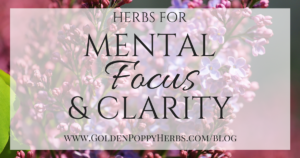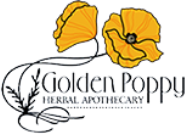
Herbs For Mental Focus & Clarity
Share
The students are back in session, the stars appear earlier in the night sky, and the heat of the season is cooling off. Autumn is just weeks away, and the care-free, dreamy days of summer give way to preparation, study, and contemplation in cafés. Herbs can help you swing into fall with focus, clarity, and a sharp mind that might have grown accustomed to the effortless, endless summer days. Our best brain tonics, also called nootropics, are known for their acute ability to improve memory and cognition by: combating oxidation, enhancing cerebral circulation, reducing inflammation, and boosting mood. This combination ensures a steady supply of new energy, nutrients, and oxygen to the body’s most active organ. Additionally, many of these herbs have secondary benefits for reducing stress and improving immunity, making them excellent allies as we charge back into work. The herbs you may be most familiar with thanks to their pleasant taste and aroma, the mints, are excellent brain boosters. Just smelling these herbs can relieve tension while, simultaneously, keeping us attentive and alert. The following are also known for their anti-inflammatory effects and ability to inhibit the enzyme responsible for the breakdown of Acetycholine, a neurotransmitter critical for neuroplasticity, as we age. Enjoy them as a tea or as flavorings for your next meal. Lemon Balm (Melissa off.)— Lemonbalm is an uplifting and joyful herb for the mind and heart. It is gently calming and simultaneously improves cognition, attention span, memory, and mood. This herb is great for relieving anxiety, and insomnia. Rosemary (Rosmarinus off.)—An herb of remembrance. Just a pinch of Rosemary, tasted or smelled, helps to improve the speed of memory recall. A potent antioxidant, circulatory stimulant, this aromatic herb can help to relieve pain and reserve oxidative stress. Peppermint (Mentha piperita)—Peppermint will reliably increase oxygen flow to the brain, not only for improved attention, but also to alleviate headaches or brain fog. A well-reputed digestive aid, peppermint can also alleviate any nervous indigestion. Widely available, peppermint tea is an excellent alternative to caffeinated beverages in the evening when work demands stretch into the evening hours. When we feel anxious or overwhelmed, our mental performance can be the first sign of distress. Adaptogens are a class of herbs, which when taken consistently have the ability to regulate the body’s ability to ‘adapt’ to stressors. Adaptogens are perfect for those of us needing to recover from the damaging effects of stress or prime us for mentally, emotionally, and physically demanding periods. The herbs listed have a long history as traditional remedies in Ayurvedic medicine, and will also compliment any mindfulness or yogic practice. Gotu Kola (Centella asiatica)—Gotu kola is a favorite back-to-school herb among Indian children, as it improves mood and cognitive function, while balancing relaxation with increased energy. It will also reliably improve circulation, collagen production, and circulation, making it helpful in healing physical traumas. Bacopa (Bacopa monnieri)—Called the ‘scholar’s herb,’ Bacopa, as a longevity tonic, supports the retention of new information and improve a person’s recovery from brain and neurological trauma. It can relieve mental exhaustion, forgetfulness, and even alleviate the emotional stress of anxiety and depression. Holy Basil (Ocimum sanctum)—Holy basil is a highly revered herb for connection with higher states of consciousness. It calms without sedating and can especially help us to ‘tune in’ to the present moment. It is an herb of meditation, assisting us in receptive states. Holy basil will also lift mental fog, particularly from excessive drug use. Any conversation about brain tonics would be incomplete without discussing Ginkgo (Ginkgo biloba). This premier memory herb is best known for supporting mental decline due to aging. As an antioxidant and circulatory tonic, it can revive regions of the brain with fresh blood supply and reverse damage caused by chronic neurological conditions. This couples with its’ ability to prevent blood clotting to reduce a person’s risk for stroke. It even improves the brain’s use of glucose, oxygen, and ATP. Ginkgo, beyond others, is a reliable companion for an aging mind. Other supportive strategies for clearing some healthy head-space include getting restful sleep, exercise, and healthy doses of critical brain food, such as complete proteins and monounsaturated fats. As you reset for the coming season, a change of routine, committing to learning something new, and getting creative can all support strong, elastic neural connections. As you explore the mental demands of this seasonal transition, never forget that the earth has many gifts waiting to be discovered to enjoy and bring peace to your beautiful mind. Resources: Herbal Medicine from the Heart of the Earth by: Dr. Sharol Tilgner, ND Body in Balance by: Maria Noel Graves Clinical Botanical Medicine by: Dr. Eric Yarnell, ND


